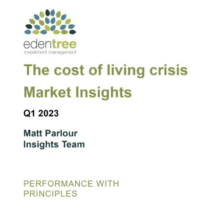The past 18 months have been tumultuous for investors, with the global pandemic causing deep uncertainty. Now, as the UK contends with rising inflation and an energy crisis, Fundcalibre spoke to fund managers about their biggest concerns.
Mike Riddell, manager of Allianz Strategic Bond, said much of the focus around the energy crisis had centred on inflation, with little thought for what it means for growth.
Riddell said: “Big jumps in energy prices are normally associated with major growth slowdowns about six months later, where the doubling in oil prices in the first half of 2008 is one of the best examples. Markets are pricing in lots of inflation already but risky assets aren’t remotely contemplating the growth hit.”
For Rosemary Banyard, manager of VT Downing Unique Opportunities, political events in China pose the biggest threat to investments.
“What scares me the most is the risk that China may decide to take control of Taiwan by force. The recent Aukus nuclear submarine deal with Australia*, the removal of Chinese technology from telecoms and nuclear infrastructure and the $52 billion of funding to boost US silicon chip production all confirm a new Cold War.
“A bit of cash and some investments in the shrinking listed UK defence sector may not offer much of a buffer to this black swan.”
Meanwhile, Chris Garsten, co-manager of Waverton European Capital Growth, said the monumental rise in raw material price rises and the knock on effects on electricity and aluminium could adversely affect investments going forward.
Garsten explained: “Some companies have already warned of profit problems – the wind turbine manufacturer Siemens Gamesa is one. It hedges on a rolling 12-month basis, but its projects have longer lead times. Others will gain on a relative basis. Scandinavian electricity prices have hardly risen as the region has such a strong bias to hydro generation.”
Others raised developments in the ESG market as a cause for concern. William Lam, manager of Invesco Asian, warned the trend for making investment and capital allocation decisions based on ESG considerations alone could lead to unintended consequences.
“We are seeing such consequences already in the form of extremely high coal and gas prices. I am sure there is more to come, making the world a more uncertain place. While we all desire to make the world a better place, whenever there is clear herd behaviour among companies and investors it tends to make me wary. This time is no different.”
However, David Harrison, manager of Rathbone Greenback Global Sustainability, believes there is a missed opportunity to help improve sustainability.
Harrison said: “There are two issues that concern us particularly. From a sustainability perspective, a failure to implement a credible and globally coordinated framework to achieve net-zero by 2050 or before. We think the upcoming COP-26 conference will be critical in this context. If this opportunity is wasted, the goal of limiting global warming to 1.5 degrees looks increasingly difficult to achieve.
“From a pure market perspective, the risk of central bank error is our biggest worry. Tightening monetary policy too aggressively could significantly impact the global recovery in 2022 and release the spectre of stagflation.”
* [Deal between the US, UK and Australia to equip Australia with nuclear submarines]
[Main image: tech-daily-ztYmIQecyH4-unsplash]


































